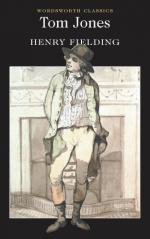|
This section contains 8,244 words (approx. 28 pages at 300 words per page) |

|
Dictionary of Literary Biography on Henry Fielding
Many critics, Martin C. Battestin and C. J. Rawson perhaps most prominent among them, have described Henry Fielding both as the last and one of the greatest representatives of the Augustan Age in English literature. In their rather different accounts of Fielding's achievement, Battestin and Rawson share an implicit sense that the Augustan spirit in literature is characterized by concern for significant literary form. Rawson argues that in Fielding's novels the allegiance to "formal ordering" of earlier Augustan writers such as Alexander Pope and Jonathan Swift comes under "stress." Rawson is fascinated by Serjeant Atkinson's physical awkwardness in Amelia (1751), fascinated by tokens of Fielding's sympathies with the disorderly and unruly. Battestin is fascinated by the careful artifice of Tom Jones (1749)--the counterpointing of characters, the richly orchestrated plotting, the recurrent suggestion of an emblematic dimension in the characterization. He sees in all this an echoing by Fielding of...
|
This section contains 8,244 words (approx. 28 pages at 300 words per page) |

|


